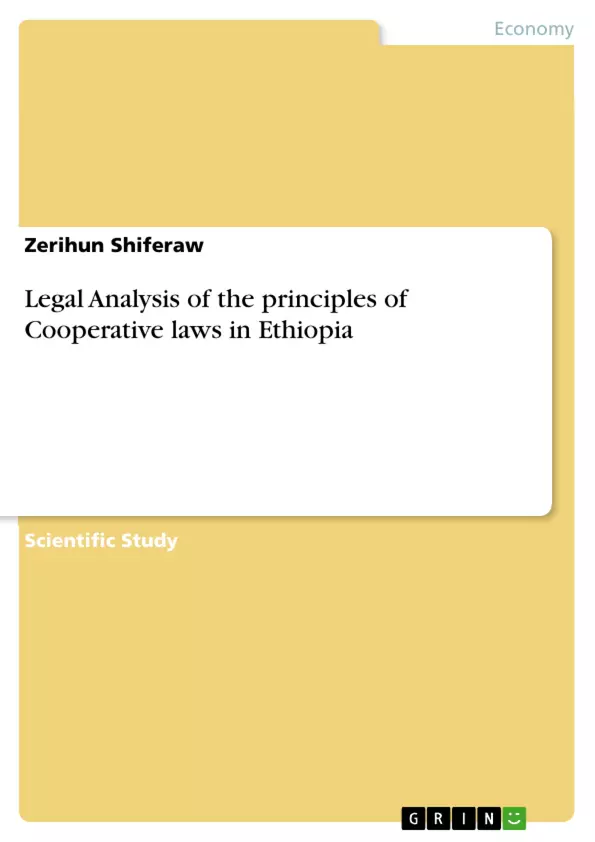Cooperatives are associations established and managed by private persons in order to address the economic and social needs of their members. Human cooperation is an age-old phenomenon, so much so that one can trace the history of cooperation to the time when people started to live together. Thus, it is difficult to give the credit of origination to this or that society.
The earliest cooperative movement is believed to have appeared in Europe in the late 18th and 19th centuries, during the era of the industrial revolution. In Africa, the concept of cooperatives existed long before and during the colonial period, but it flourished in its present form only after independence.
An understanding of the status of cooperatives in present-day Ethiopia demands the knowledge of traditional forms of cooperation that existed long ago, as they are the building blocks for the development of cooperatives.
Having this general highlight on cooperatives, this paper entails three parts. The first part which is devoted to the general overview of cooperatives deals with the definition, historical background, and various types of cooperatives. In the second part, we shall capitalize on the distinguishing marks of cooperatives from other forms of business organizations and their common features. The last, but not least, part mainly discusses the underlying principles guiding the operation of cooperatives in general and their status in Ethiopian legislation.
Inhaltsverzeichnis (Table of Contents)
- Part One: General overview
- 1.1 Definition of cooperatives
- 1.2 The historical development of cooperatives in Ethiopia
- 1.3 Types of cooperatives in Ethiopia
- 1.2.1 Housing cooperatives
- 1.2.2 Building cooperative
- 1.2.3 Retailers' cooperative
- 1.2.4 Worker cooperative
- 1.2.5 Producer cooperatives
- 1.2.6 Consumer Cooperatives
- 1.2.7 Agricultural cooperative
- 1.2.8 Credit cooperatives
- Part Two
- 2.1 Basic features of Cooperatives
- 2.1.1 Unique features of cooperatives
- 2.2 The Common features of cooperatives with business organizations
- 2.2.1 Contract
- 2.2.2 Plurality of persons
- 2.2.3 Common Interest
- 2.2.4 Collaboration
- 2.2.5 Contributions
- 2.2.6 Purpose
- 2.2.7 Formality
- 2.2.8 Legal personality
- 2.2.9 Limited liability
- 2.2.10 Role of members
- Part Three
- 3.1 The Guiding Principles of cooperatives and their Legal Regimes in Ethiopia
- 3.1.1 Guiding Principles of Cooperatives
- 3.1.2 Voluntary and Open Membership
- 3.1.3 Democratic member control
- 3.1.4 Member Economic Participation
- 3.1.5 Autonomy and Independence
- 3.1.6 Education, Training and Information
- 3.1.7 Cooperation among Cooperatives
- 3.1.8 Concern for Community
- 3.2 Principles of cooperatives in Ethiopian laws
Zielsetzung und Themenschwerpunkte (Objectives and Key Themes)
This paper aims to provide a comprehensive analysis of the principles of cooperative laws in Ethiopia. It explores the historical context of cooperatives in the country, examines their defining characteristics, and delves into the legal framework that governs their operation. The paper highlights the significance of cooperatives in addressing economic and social needs, emphasizing their role in promoting self-reliance and community development.- The definition and historical development of cooperatives in Ethiopia
- The distinguishing features of cooperatives compared to other business organizations
- The guiding principles of cooperatives and their legal regimes in Ethiopia
- The role of cooperatives in addressing economic and social issues in Ethiopia
- The importance of cooperation and collective action for social and economic progress
Zusammenfassung der Kapitel (Chapter Summaries)
Part One: General Overview
This part introduces the concept of cooperatives, providing a definition and outlining their historical evolution, particularly in Ethiopia. It explores the various types of cooperatives operating in the country, including housing, building, retail, worker, producer, consumer, agricultural, and credit cooperatives.Part Two: Basic Features of Cooperatives
This part focuses on the defining characteristics of cooperatives. It distinguishes cooperatives from other forms of business organizations, highlighting their unique features such as voluntary membership, democratic control, and member economic participation. It also discusses the common features shared with business organizations, such as contractual agreements, plurality of persons, and shared interests.Part Three: The Guiding Principles of Cooperatives and their Legal Regimes in Ethiopia
This section delves into the principles that govern the operation of cooperatives, including voluntary and open membership, democratic member control, member economic participation, autonomy and independence, education, training, and information, cooperation among cooperatives, and concern for community. The part also examines the legal framework surrounding cooperatives in Ethiopia, analyzing relevant legislation and its implications for their operation.Schlüsselwörter (Keywords)
The paper focuses on the key themes of cooperatives, their features, principles, and their legal framework in Ethiopia. It explores the historical development of cooperatives in the country, analyzes their unique characteristics, and examines the legal regimes governing their operation. Relevant terms include cooperative law, member participation, democratic control, economic development, social equity, and community engagement.- Citation du texte
- Zerihun Shiferaw (Auteur), 2014, Legal Analysis of the principles of Cooperative laws in Ethiopia, Munich, GRIN Verlag, https://www.grin.com/document/1313301



